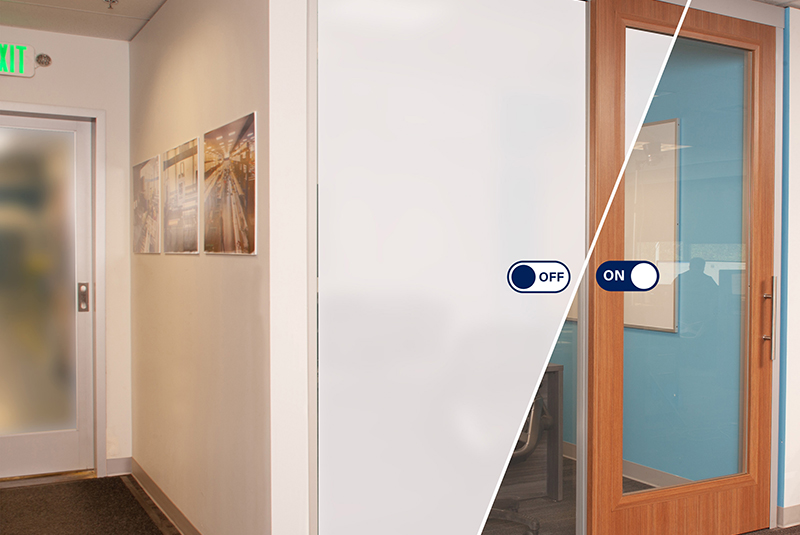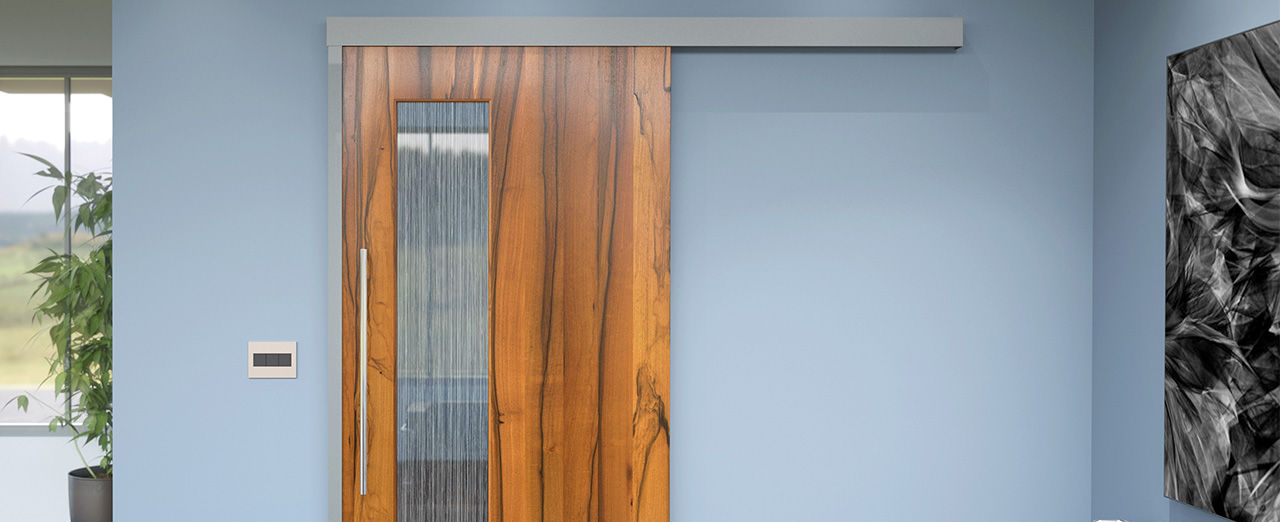
Independently, sliding doors have long been recognized to support space-efficient and accessible floorplans. Likewise, as demonstrated in this portfolio of installed hospital projects, the use of decorative and specialty glass can support a health care interior design that meets multiple best-practice recommendations. When these systems are combined, design teams can deliver significant value to project owners, medical providers and patients.
Door hardware supports modern health care interior design aesthetics and functionality
In health care interior design, door hardware can be one of the more difficult elements to specify. Not only do these components need to meet building code and accessibility requirements, but specifiers are often going above required minimums to improve occupant experience. Complete door systems such as ExamSlide are designed for high-quality operation and with components that work seamlessly together to achieve performance and aesthetic objectives. The complete system approach also makes it easy for specifiers and designers to select and specify premium products with comprehensive features.
For instance, automatic sliding doors can improve building accessibility and hygiene by allowing doors to be opened hands-free with a wave or foot petal actuation. These systems also operate at a predetermined speed, which can support infection control by reducing air turbulence in pressurized environments and include sensors to ensure safe operation for users of all ages and abilities.
Further, commercial sliding doors that meet Builders Hardware Manufacturers Association (BHMA) standards provide specifiers with a better sense of how these components will contribute to a more resilient built environment. All of AD Systems’ flexible opening solutions have been certified to BHMA standards to provide long-term viability. Likewise, systems, like ExamSlide™, easily incorporate locking hardware to contribute to more functional provider areas.
Sliding glass doors balance visual connection and privacy in health care settings
In a recently completed intensive care unit (ICU) renovation in Kentucky, ExamSlide doors with locking hardware supported a sense of privacy in respite and workspaces. In addition, like many other ICUs, finding a balance between privacy and visual connection is a key consideration for this project.
Sliding and flexible swing doors from AD Systems are available as full-lite glass doors. This type of door maintains acoustic isolation without sacrificing sightlines across a floor. Of the ICU renovation, Dr. Ashley Montgomery-Yates, Senior Vice Chair of Medicine at University of Kentucky, explains that finding a balance between connection and privacy was important to the medical providers.
Opening solutions from AD Systems can be specified in a wide range of glazing products—from fully clear to completely frosted. Full-lite sliding glass doors can also be specified with integral blinds or louvers as well as switchable privacy glass, so medical providers can select the appropriate level of privacy for a given use. Not only do these options provide a higher degree of flexibility, but they also improve building hygiene when compared to curtain systems.
Smart Glass pushes functional health care interior design beyond the door
Along with door specification, Smart Glass offers a great way to balance hospital hygiene with patient respect and decency. The dynamic glass can be activated by a wall switch, remote control, or even movement sensors or voice activation for a zero-touch solution. This provides a safer, more hygienic solution in care settings where frequent patient checks are required.
Unlike curtains, which must be periodically removed, laundered and rehung, smart glass partitions can be cleaned several times a day. The switch-activated privacy glass allows for targeted sanitization and more frequent cleaning schedules.
Laminated Smart Glass, such as SDX2 from Chicago-based Skyline glass, also provides noise control. With a noise rating of around 35dB, this domestically fabricated product offers greater acoustic protection from the noise of a busy hospital ward than curtains. Available with a low haze factor and fully customizable, SDX2 and other smart privacy glass options also facilitate a more private, thoughtful and hygienic environment for patients, promoting rest and improving healing.
Branded writable surfaces improve communication and collaboration
In addition to privacy and decoration, decorative glass also has the potential to support improvements to the level of care health care professionals can provide. Customizable writable glass offers medical facilities a way to align staff communication and enhance collaboration.
Available as mobile boards, stationary care boards and fully integrable into doors and sidelites, these writable surfaces can also be specified custom colors and digitally printed elements to suit your project’s branding, wayfinding, or patient care needs. These glass surfaces are easy to clean with standard health care procedures to maintain a more hygienic built environment.
Join the conversation on health care interior design
Specifying flexible opening solutions as well as decorative or dynamic “smart” glazing are only some of the many ways doors, glass and other aspects of health care interior design can align functionality with contemporary aesthetics. With all the options available, it is important for designers to stay current with the capabilities of current products and systems.
Knowing how a door or type of glazing can help meet a design goal can simplify specification and make previously unattainable designs more possible. To support design professionals in this space, AD Systems and Skyline glass have informational resources online as well as expert teams ready to guide design firms in how they can add value to their next health care project.







